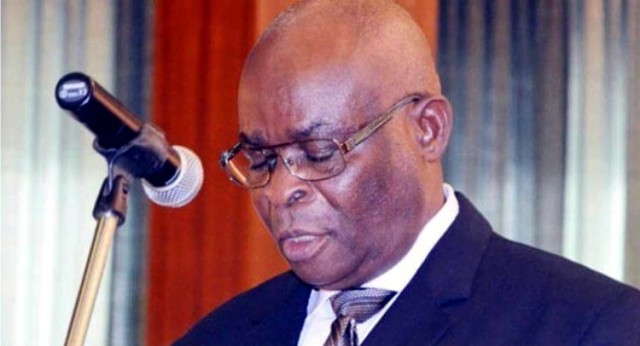Editorial
Task Before The New CJN

After an unprecedented, yet needless drama that delayed his confirmation, Justice Walter Samuel Onnoghen was, at last, sworn in as the 15th substantive Chief Justice of Nigeria (CJN), penultimate Tuesday.
The inauguration of the new CJN by Vice President Yemi Osinbajo, who until last Monday, was the Acting President in the absence of President Muhammadu Buhari has, therefore, put to rest the suspense that had made Onnoghen’s ascension to the number one position in the nation’s judiciary hang in the balance for unprecedented three months.
The Tide recalls that following the retirement of the immediate past CJN, Justice Mahmud Mohammed on November 10, last year, Justice Onnoghen, who is the most senior officer on the bench, was appointed by President Buhari to oversee the nation’s judiciary in acting capacity. His confirmation was, however, kept in unusual suspense for over three months due to what the Presidency called ‘security check’. This gave room for speculations and suspicion that the Buhari administration may not have been comfortable with appointing a southerner as CJN.
Justice Onnoghen is from Cross River State in the South-South geo-political zone and the only southerner to occupy such exalted judicial position in the last 30 years after Justice Ayo Gabriel Irikefe.
While The Tide congratulates Justice Onnoghen on his well deserved appointment, we also commend the resilience of many Nigerians in ensuring that justice and merit prevailed in his appointment.
Beyond the euphoria of Justice Onnoghen’s confirmation, however, is the enormous task ahead of him. Occupying the number one judicial seat at a time when the Nigerian judiciary seems to be on trial and virtually battling with a battered image is indeed challenging. But it is imperative and urgent too, that the new CJN cleanses the proverbial Augean Stable and restores public confidence in the judiciary.
From the deliberate delays in the administration of justice to the culture of tardiness and corruption that have continued to rob the judiciary of its integrity, impartiality, fairness and independence, there is no gainsaying the fact that there are bad eggs in the nation’s administration of justice system.
The Tide expects the new CJN to change this ugly narrative. Under him, Nigerians look forward to an independent and corruption-free judiciary that will neither be intimidated, compromised, nor encumbered by external forces as has been the case for some years now. He should be courageous, bold and firm in asserting the independence of the judiciary. He should live up to his promise that no external influence can pocket the judiciary under his watch.
Among other challenges before Justice Onnoghen is the flagrant violation, by the executive arm of government, of Section 287 of the nation’s Constitution which imposes on all political office holders a binding duty to obey the judgments of the court. It is regrettable to note that disobedience to court orders is fast becoming the norm under the Buhari administration. This, to us, constitutes impunity and therefore, the greatest threat to our democracy.
While we encourage the new CJN to assert the independence and sanctity of the judiciary, the third organ of government should not, however, constitute an impediment to the ongoing anti-corruption crusade of the Buhari administration.
Given the erosion of public confidence in the judiciary, there is an urgent need for internal house-cleansing. The judiciary under him, therefore, should be bold enough to wield a big stick against errant judges who have made the hallowed temple of justice the laughing stock of the public. As the chairman of the National Judicial Council (NJC), Justice Onnoghen should make the highest judicial body live up to its constitutional duty not only in terms of disciplining its erring officers, but also in injecting fresh and credible blood into the system.
Last year’s arrest and subsequent trial of some judges, including two justices of the Supreme Court by the Department of State Services (DSS) over corruption charges has particularly made this challenge imperative.
Also under Onnoghen, Nigerians are looking forward to a new judiciary where all pending cases, including high profile cases of corruption and election petitions, will be dispensed without delay or unnecessary adjournments.
Also begging for attention is the congestion of the nation’s prisons and the high cost of litigation that has made our courts the exclusive preserve of the rich.
Meanwhile, the judiciary, under the new CJN, should make the welfare of judicial officers a priority. This, we believe, will make them less pliant and less vulnerable to corrupt practices.
Editorial
Beginning A New Dawn At RSNC

Editorial
Sustaining OBALGA’s Ban On Street Trading

Editorial
AFCON ’25: Bravo, Super Eagles, But…

-

 Politics4 days ago
Politics4 days agoAPC Releases Adjusted Timetable For Nationwide Congresses, Convention
-

 Sports19 hours ago
Sports19 hours ago2026 WC: Nigeria, DR Congo Awaits FIFA Verdict Today
-
Sports4 days ago
DG NIS Wants NSC Board Constituted, Seeks Increased In Funding
-

 Business4 days ago
Business4 days agoCustoms Seek Support To Curb Smuggling In Ogun
-

 Featured4 days ago
Featured4 days agoINEC Proposes N873.78bn For 2027 Elections, N171bn For 2026 Operations
-

 Sports4 days ago
Sports4 days agoSWAN Rivers Set-up Five Functional Committees
-
News4 days ago
Police Bust Kidnapping Syndicate In PH
-
Sports4 days ago
NSC Disburses N200m Training Grants To 26 Athletes

